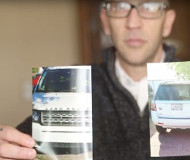Article from: www.thenewspaper.com/news/64/6489.asp
6/20/2018
US Supreme Court To Consider Car Seizure Constitutionality
US Supreme Court will decide whether seizing cars violates the constitutional prohibition on excessive fines.
 The Bill of Rights forbids the government from imposing "excessive fines," but police regularly seize cars worth thousands of dollars over non-violent offenses. The US Supreme Court on Monday agreed to decide whether Indiana police officers violated this constitutional prohibition when it grabbed a white 2012 Land Rover LR2, worth $41,558, because its owner, Tyson Timbs, had been convicted of selling a few grams of narcotics.
The Bill of Rights forbids the government from imposing "excessive fines," but police regularly seize cars worth thousands of dollars over non-violent offenses. The US Supreme Court on Monday agreed to decide whether Indiana police officers violated this constitutional prohibition when it grabbed a white 2012 Land Rover LR2, worth $41,558, because its owner, Tyson Timbs, had been convicted of selling a few grams of narcotics.
Timbs bought the SUV with the proceeds of a life insurance policy. He says he was suffering from a work-related injury and became addicted to opioids, which escalated to heroin. When his insurance money ran out, he began selling small amounts to feed his habit. He sold one set of undercover officers two grams of heroin for $225. He sold another two grams for $160. By the time he came to a third undercover officer on May 31, 2013, he ran out of drugs to sell. He was thus charged with one count of conspiracy to commit theft and one count of dealing.
Timbs admitted his guilt, and a judge sentenced him to one year home arrest, five years of probation and $1203 in fines and fees. The state then moved to permanently confiscate the Land Rover under drug forfeiture laws. The maximum penalty under the law for the offenses Timbs committed was $10,000, but the SUV was worth four times that. The judge said allowing the seizure would be "grossly disproportionate" to the offense and denied the request.
"Without my car, it is incredibly difficult to do all the things the government wants me to do to stay clean, like visit my probation officer, go to AA, and keep my job," Timbs said. "Right now, I'm borrowing my aunt's car to go to work so we can pay the bills, and she has to take a bus back and forth to her kidney dialysis appointments. You need a car to do all of these things."
Fearing judicial limits on their ability to seize automobiles, prosecutors appealed, and the Indiana Supreme Court ruled that the Eighth Amendment prohibition on excessive fines only applies to the federal government.
Opponents of civil forfeiture point out that two federal appellate court circuits and fourteen state supreme courts -- Alabama, California, Delaware, Georgia, Idaho, Illinois, Kentucky, Massachusetts, Minnesota, Nevada, Ohio, Pennsylvania, Utah and West Virginia -- apply the Eighth Amendment to the states. Indiana only has Montana and Mississippi on its side. Lawyers with the Institute for Justice representing Timbs urged the US Supreme Court to settle the issue by elevating the status of the Eighth Amendment.
"The Framers counted the protection against excessive fines as among those fundamental rights that are essential to our system of ordered liberty, and the Fourteenth Amendment's ratifiers intended that protection to apply to the states," the IJ's Wesley P. Hottot wrote.
IJ lawyers expect the high court to hold oral arguments in the case this winter.
 The Bill of Rights forbids the government from imposing "excessive fines," but police regularly seize cars worth thousands of dollars over non-violent offenses. The US Supreme Court on Monday agreed to decide whether Indiana police officers violated this constitutional prohibition when it grabbed a white 2012 Land Rover LR2, worth $41,558, because its owner, Tyson Timbs, had been convicted of selling a few grams of narcotics.
The Bill of Rights forbids the government from imposing "excessive fines," but police regularly seize cars worth thousands of dollars over non-violent offenses. The US Supreme Court on Monday agreed to decide whether Indiana police officers violated this constitutional prohibition when it grabbed a white 2012 Land Rover LR2, worth $41,558, because its owner, Tyson Timbs, had been convicted of selling a few grams of narcotics.